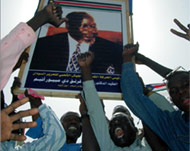Sudanese rebel makes historic return
John Garang, the rebel leader in a two-decade civil war against Khartoum, is returning to the Sudanese capital for the first time in 22 years to take up his post as vice-president.

President Omar el-Bashir will welcome Garang at the headquarters of the ruling National Congress Party on Friday before they go to Khartoum’s central Green Square, where thousands of people have turned out for a massive public reception.
Loudspeakers on a truck blared slogans of welcome, saying “Our heroic leader is coming to Khartoum today,” as people in buses carried banners in English and Arabic and pictures of a smiling Garang carrying a small child.
Sudan state television estimated four million people could turn out to welcome Garang – about 3.5 million southerners alone live in the capital.
“Garang is a hero who succeeded in leading his people to victory,” said William Ezekiel, managing editor of the Khartoum Monitor, an English-language newspaper currently suspended by the government.
Coalition government
The stage was set for Garang’s arrival and vice-presidency by the January signing of a comprehensive peace agreement that called for a coalition government, wealth and power-sharing and democratic elections within three years.
Earlier this week, the National Assembly parliament, and Garang’s Sudan Legislative Council approved an interim constitution.
 |
|
Garang has not visited Khartoum |
Garang, 60, will be sworn in as the first vice-president on Saturday, after which he and el-Bashir will sign the constitution.
Garang’s visit to the capital – he has not been there since the civil war began in 1983 – has been the lead story in newspapers and television broadcasts this week and the subject of chatter around the city.
“Frankly, we as southerners never expected to see Garang in Khartoum,” said Albino Maamon, 42, a broker in downtown Khartoum. “There were so many scenarios. Some people expected the south to secede, but he is now coming to Khartoum. That is something to reckon with.”
Changes expected
Maamon, a southerner from the Upper Nile region, said he expects many changes from Garang and the government of national unity.
“We for once will have more freedom of expressions and freedom of worship and other freedoms. That is what everybody expects,” he said.
Oliver Benjamin, managing editor of the Sudan Vision newspaper, praised the constitution and Garang’s arrival. “It’s the first time the south is going to have meaningful participation in the government,” he said. “We should look at it as the last opportunity whereby Sudan can remain united.”
A key element of the peace deal was that the south will have a referendum on secession after six years.
Many southerners seem to see Garang’s vice-presidency as a time for him to fix the woes of the south – including improving infrastructure, allotting a share of resources and easing the return of refugees – before it leaves Sudan.